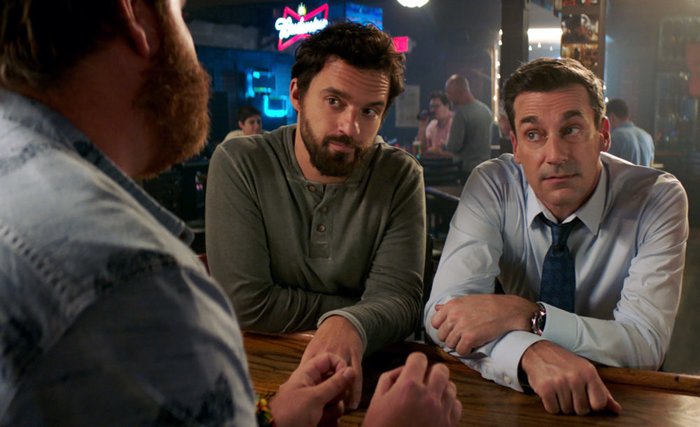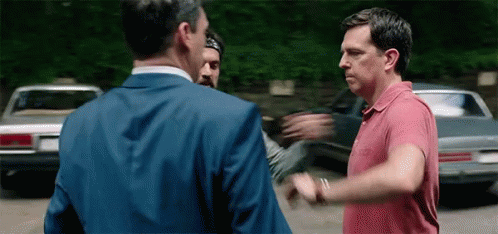UPDATE: One of the most popular reasons people find this post on Google is because they want to know “did Hoagie in Tag really die from cancer in real life?” If that’s why you’re here, here’s your answer: the individual characters in Tag are not based on specific people. They’re amalgamations of the real-life friends who have played this game for years. There is no actual Hoagie, so no, he did not die.
If that’s all you needed, have a great day — and maybe text a friend just to say hello!
And now, on with the original post…
*
Tag shouldn’t work as a movie, but it does — almost despite itself.
The film, based on the true story of a group of childhood friends who’ve been playing the same game of tag for 30 years, is absurd enough to be memorable and simple enough to support a wide array of comedy setpieces.
In theory, this should be a good thing.
Unfortunately — and maybe because the concept is so broad — Tag doesn’t quite seem to know what kind of comedy it wants to be.
Luckily, it also has a hugely talented cast who manage to elevate some dodgy material and combine to deliver a surprisingly emotional payoff.
The final verdict?
Much like Jumanji: Welcome to the Jungle, I find myself recommending a movie I didn’t necessarily like because it nails the landing by getting its most important ingredients right.
First, let’s explore Tag’s biggest problem, and then I’ll explain how it still finds a way to win.
WARNING: SPOILERS AHEAD for a movie about grown men trying to tag each other.
Tag Can’t Quite Find Its Comedy Balance
Look: making any good comedy is hard — a challenge that’s complicated by the fact that humor is highly subjective.
Comedy relies on surprise. But since we all have different life experiences and points of reference, every joke surprises each of us slightly differently. What you think is amusing, I may find boring… or bland… or offensive… or scandalous… or hilarious.
The current Hollywood comedy trend is to spray a wide variety of humor — some lowbrow and some high, some blatant and some nuanced, some clean and some crass. For each audience member, many of the jokes will miss, but some will land, and a few will land big. They just have to hope that the sum total adds up to a positive, and that the misfires don’t totally ruin the goodwill of the overall vibe.
And that’s where Tag almost loses its balance.

Because it’s the story of five overgrown adolescents, the characters are all at seemingly major adult turning points in their lives — career apex, new wedding, relationship trouble — yet their sense of humor is mostly vulgar and sophomoric.
So if you’re amused by the idea of Ed Helms explaining why the game’s bylaws include an amendment that you are allowed to punch someone in the ass but not in the asshole…
or Jake Johnson turning a man’s tragic death and a woman’s potential miscarriage into recurring jokes…
or Isla Fisher repeatedly threatening to waterboard someone (like, literally, with the guy tied to a chair in a basement)… then you’re squarely in Tag‘s target demographic.

The one safety valve the film has in this regard is Jon Hamm, whose reaction to his friends’ behavior frequently mirrors that of the audience: eyebrow raised, disappointed scowl, visibly can’t quite believe they said what they just said.
Admittedly, the idea of a group of 40-something men chasing around the country to tag each other is potentially polarizing to begin with. Either you find it potentially charming and endearing, or you find it self-indulgent, childish, and asinine.
The problem is, Tag tries to have it both ways, but it falls short in both directions.
Its lighter humor isn’t sharp enough to be memorable, and its gutter humor isn’t dirty enough to be shocking. Instead, the characters’ obsessive behavior and blatant disregard for everyone and everything other than the game frequently straddles the line between “empoweringly zany” and “worryingly psychopathic” — a line I didn’t even know existed before Tag.
As a result, Tag really does feel like the PG-13iest comedy imaginable, which is doubly frustrating considering how much better it could have been had it leaned more confidently in either direction.
But where Tag‘s comedy falls short, it has an ace up its sleeve: the last five minutes.
OKAY, SERIOUSLY: ACTUAL SPOILERS AHEAD for a movie where Hannibal Buress gets his pants pulled down and falls over while Jeremy Renner punches Ed Helms in the ass.
Tag’s Solid Theme Saves It from Its Wobbly Execution

To appreciate how Tag‘s lightweight stakes still lead to an emotional payoff that feels earned, let’s quickly zoom through its plot.
At the end of May, Hoagie (Ed Helms, The Hangover) rallies his childhood friends — insurance CEO Bob (Jon Hamm, Mad Men), divorced stoner Chilli (Jake Johnson, New Girl), and paranoid overthinker Sable (Hannibal Buress, Broad City) — for one last hurrah of their annual month-long game of tag.
Why?
Hoagie explains that their fifth player, fitness guru Jerry (Jeremy Renner, The Avengers), has announced that he wants to retire from the game for good — and he’s never been tagged “it” in all 30 years of the game.
Hoagie refuses to let Jerry and his spotless record retire without a fight. This becomes the film’s ticking-clock goal: Jerry must be tagged before June.
So the guys fly home to Spokane where Jerry is getting married. There, Jerry’s fiancée Susan (Leslie Bibb, The League) makes them all sign an amendment to the bylaws promising that they will NOT ruin her wedding with their game.

Hoagie convinces the guys that they’ll still have plenty of time to tag Jerry beyond the constraints of official wedding activities… but Jerry is basically a ninja and their attempts to tag him fail spectacularly.
Despite lots of help from Hoagie’s ultra-competitive wife Anna (Isla Fisher, Now You See Me) and Wall Street Journal reporter Rebecca (Annabelle Wallis, The Mummy) — who tags along on her own quixotic quest to understand why five guys are still playing tag in their 40s — Jerry’s May 30th wedding ceremony concludes with him still untagged and no solution in sight…
Until Hoagie tries one last desperate move.
Of course, his move backfires and sends Hoagie to the hospital… where he unravels the true nature of the plot, the game, and the movie’s theme.
See, it turns out Hoagie was lying.
Jerry never said he wanted to retire. Why would he? In fact, he reveals that he loves the game because, over the years, it’s the only way he still gets to see his old friends who’ve all moved away and left him behind. He confesses that he didn’t invite them to be in his wedding because he always felt like the four of them were closer than he was.
That’s when they clue him in on the secret: he’s been playing the game wrong for 30 years.
The point isn’t to not get tagged; the point is to stay in touch. By always avoiding their tags, Jerry realizes he’s forced them to come to him, rather than being an active participant in their lives.
As they renew their long-standing bond of friendship, it turns out there’s a second twist.
Hoagie was lying for a reason: he has cancer, and “there’s a very good chance I won’t be here next May.”
So he lied to get them all together again — not for Jerry, but for himself.
With five minutes left until midnight, bed-ridden Hoagie asks Jerry to come closer so he can tag him. Jerry is reluctant, until Hoagie plays his final card:
“If I’m still ‘it’ at midnight, and I die, that means the game ends and I take it with me.”
Hoagie wants to tag Jerry so the others will keep the game alive.
Jerry consents… and then, with just a few minutes left on the clock, Jerry smirks and tags someone else. The game is still on!
The whole gang chases each other into the hospital lobby where the game continues, until the last and final twist — and, for my money, maybe the most poignant.
Tag’s Easily Overlooked Key Scene

Earlier in the movie, Rebecca asks Anna, “if you’re so competitive, why don’t you play too?” Anna explains that the guys made these rules up when they were still kids — “no girls allowed” — so she helps Hoagie as much as she can in order to stay connected to them in her own way.
At the end of the movie, with the clock running out, Jerry — who’s currently “it” — tags Anna.
“I can’t be ‘it’,” she says. “No girls allowed.”
But Jerry won’t let go. He looks around the room:
“New amendment!” he announces. “Girls can play too.”
Any objections?
None.
(We’ll come back to this in a second.)
The movie ends with the whole cast chasing each other down a hospital hallway, in defiance of all propriety, with no regard for anyone else. Just a bunch of overgrown kids, boys and girls alike, still playing like they’re children, keeping a game alive for another year… and, maybe, for another generation.

If you’re inclined, you can see this ending — and the whole film — as an indictment of all the most self-indulgent aspects of man-child behavior, obsessive gamer culture, and America’s eternal reluctance to ever grow up.
Or, you can see it as a refreshing, freeing, and life-affirming ode to friendship, willful connectivity, and play in an era where we only ever seem to value drama, work, and Taking Things Very Seriously.
Personally?
Despite all the misfired jokes, the frequently misguided tone, and the plot that was more random distractions than heartfelt connections, I have to admit, I found it honestly refreshing to see a film where business, reputation, ego, and pride are all put aside for the sake of friendship, support, and freedom from the artificial pressures of society.
As Tag reminds us: “You don’t stop playing because you grow old; you grow old because you stop playing.”
Which is why the scene where Jerry tags Anna really hit me a few hours after the movie was over, and I realized the true significance of that moment:
By finally letting Hoagie tag him, Jerry becomes the catalyst for a new chapter in the game.
And by Jerry tagging Anna in and amending the game’s rules, Jerry gives Anna an ironclad way to stay connected to the group through their annual game, no matter what happens to Hoagie. Their bonds of friendship have expanded. She’s officially included.
The game will live on.
Like I said, comedy is hard. It’s imperfect, just like life.
But as long as we’re here, we get to keep playing.
Together. (That’s the key to every great story.)
And in the end, that bond of togetherness is worth a few misfired jokes among friends.

If You Liked This Post…
You may also like learning why Cobra Kai‘s pilot works so well, or how Iron Man established the formula for every MCU movie.


0 Comments